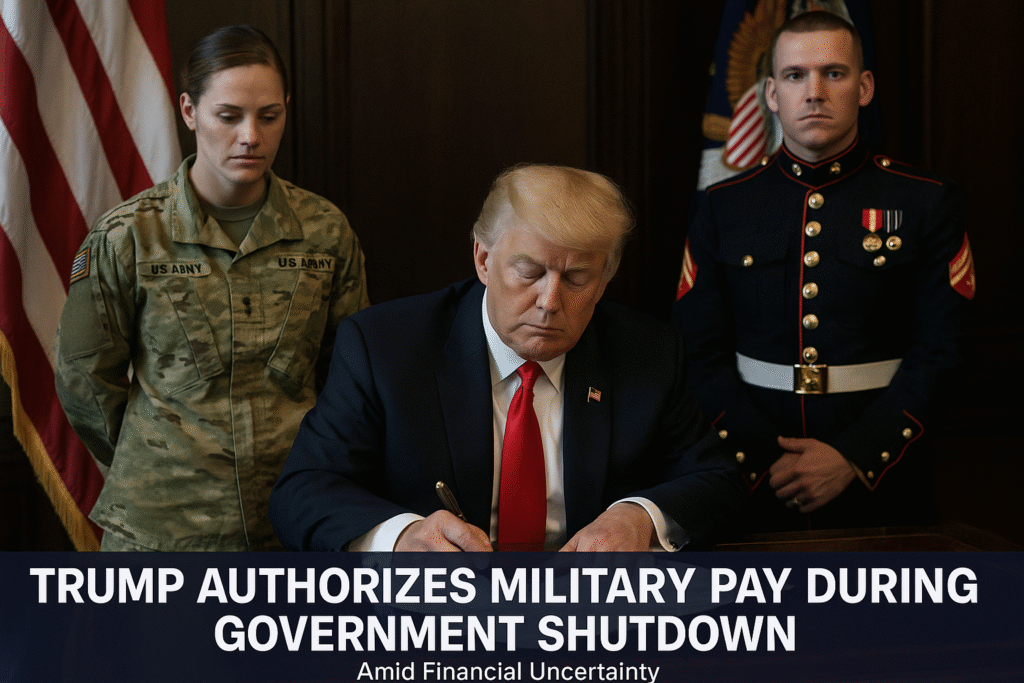By Harshit | October 12, 2025 | Washington, D.C. 7 AM EDT
Trump Assures Military Pay Amid Government Shutdown
President Donald Trump announced Saturday that his administration has found a way to pay U.S. troops during the ongoing government shutdown, which began on October 1. In a post on his social media platform Truth Social, Trump stated that he had authorized Defense Secretary Pete Hegseth to use “identified funds” to ensure that military members would receive their scheduled pay on October 15.
During a government shutdown, federal employees and military personnel often face delayed paychecks if Congress fails to pass appropriations bills. Trump emphasized that he would not allow the Democrats to “hold our Military, and the entire Security of our Nation, HOSTAGE” amid the shutdown.
Trump’s post on Truth Social read: “That is why I am using my authority, as Commander in Chief, to direct our Secretary of War, Pete Hegseth, to use all available funds to get our Troops PAID on October 15th. We have identified funds to do this, and Secretary Hegseth will use them to PAY OUR TROOPS.”
Scope of Military Pay
The U.S. military comprises roughly 1.3 million active-duty members, in addition to hundreds of thousands of National Guard members and non-service employees working under the Department of War. Without action during the shutdown, these personnel would face missed paychecks, threatening financial stability for military families.
The Pentagon confirmed to USA TODAY that military members were last paid on Tuesday, September 30, and would not receive another paycheck until appropriations were restored. Trump’s announcement comes as a critical intervention to ensure that service members continue to be compensated despite congressional gridlock.
Political Tensions Over Military Funding
Military pay has become a flashpoint in the ongoing shutdown. On October 9, a woman identifying herself as a military spouse confronted House Speaker Mike Johnson, R-Louisiana, during a C-SPAN call-in program. She detailed how her two children with severe medical conditions could be endangered due to missed paychecks.
“As a Republican, I’m very disappointed in my party, and I’m very disappointed in you, because you have the power to call the House back,” she said.
Speaker Johnson expressed sympathy but placed responsibility on Democrats, stating that their obstruction of appropriations was the cause of uncertainty. This incident highlighted the human impact of the shutdown on military families and fueled public scrutiny over congressional inaction.
Legislative Efforts to Ensure Pay
Rep. Jennifer Kiggans, R-Virginia, has been actively working to protect military pay during the shutdown. She proposed legislation in September that would ensure active-duty members receive their salaries even when the federal government is partially closed. Kiggans urged House GOP leadership to swiftly pass her bill, emphasizing the urgency of safeguarding military families from financial hardship.
Trump had previously indicated on October 9 that military personnel would not miss a paycheck, hinting at potential standalone legislation to address the issue. His Saturday announcement formalized a mechanism to guarantee pay, leveraging funds already available to the Department of War.
Impact on Federal Civil Workers
While military pay is now addressed, other federal employees remain affected. Civil workers were expected to receive smaller paychecks on October 10 due to the shutdown. The broader impasse in Congress continues to disrupt federal services, highlighting ongoing political tensions over budget appropriations and national security priorities.
Trump’s intervention specifically targets military personnel, reflecting his administration’s prioritization of the armed forces amid a high-stakes political showdown.
Public and Political Response
The move to authorize military pay is likely to have both political and social implications. For many military families, timely paychecks are crucial for housing, healthcare, and daily expenses. Trump’s decision may alleviate immediate concerns but does not resolve the underlying government funding crisis.
Observers note that congressional leaders, including House and Senate Republicans and Democrats, remain at odds over broader spending bills. While the president has ensured military pay, the uncertainty for other federal employees and programs persists.

